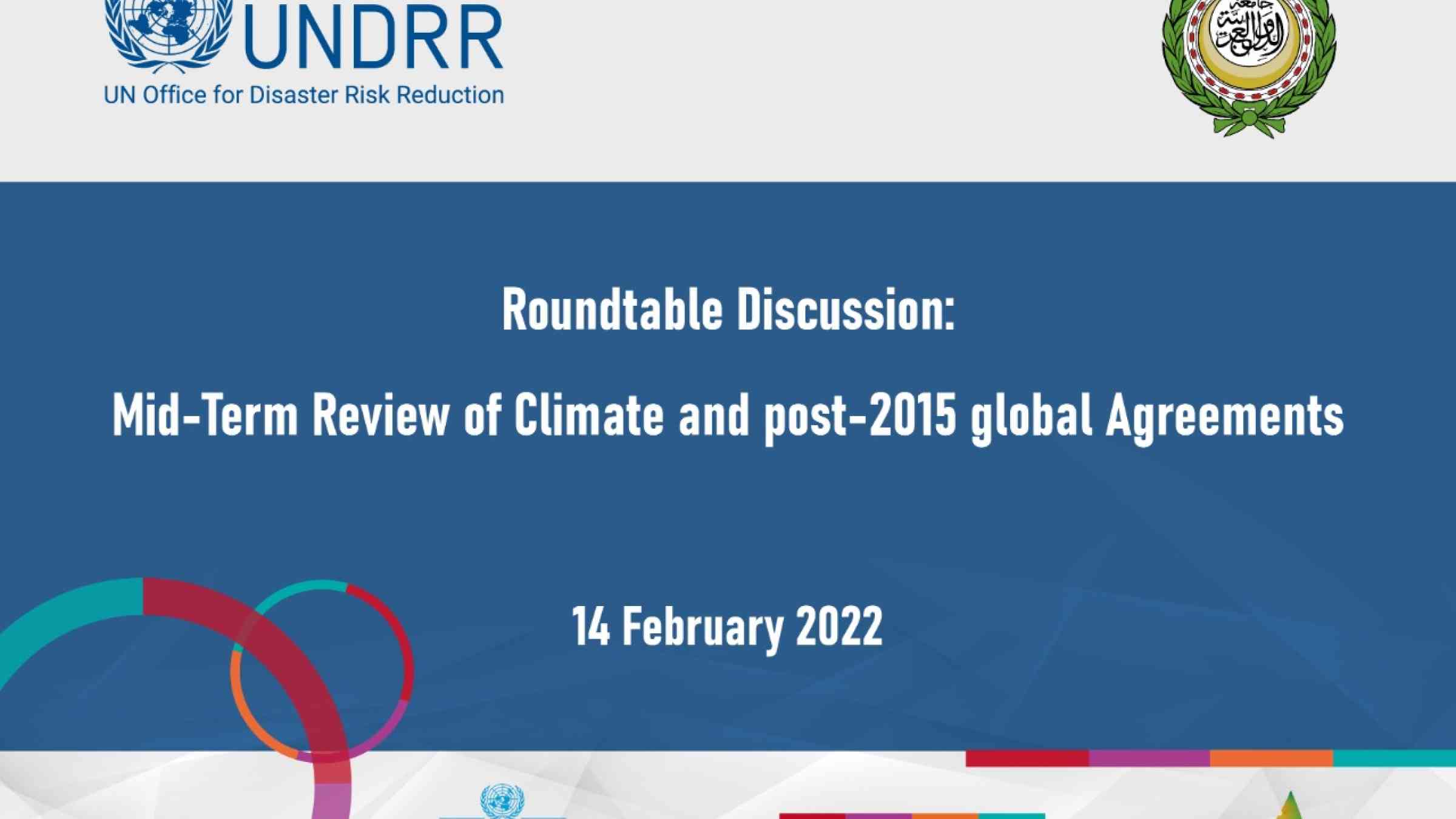Roundtable Discussion: Mid-Term Review of Climate and post-2015 global Agreements

Hybrid - Ritz Carleton - Nile
https://us02web.zoom.us/j/89207965833
- English
Background
The Arab Region is considered one of the world's major climate change hotspots and highly vulnerable to the negative impacts of global warming.
Depending on the extent of climatic disruption, the consequences of climate change are expected to worsen already critical situations present in the region, and function as a risk multiplier to disasters, human security, and political stabilization. The COVID-19 Pandemic has magnified issues affecting the region for decades including violence and conflict; inequalities; unemployment; poverty; inadequate social safety nets; human rights concerns; and insufficiently responsive institutions and governance systems.
The implementation of the post-2015 global frameworks is impacted to a large extent due to the increasing social vulnerabilities in the region as a result of climate change and the pandemic among other aspects. This, in turn, has increased the vulnerability of people to disaster and climate risk tremendously and hindered the aspired achievement of sustainable development by 2030; a vicious cycle that requires accelerating all-of-society concerted efforts in the remaining seven years of the lifespan of these global frameworks.
Half-way into the lifespan of the global frameworks, global stock-take exercises and mid-term reviews are underway until 2023 with the aim to assess the world’s collective progress towards achieving the goals and targets of these frameworks and accelerating progress in view of the setbacks witnessed mainly due to COVID-19 pandemic over the past two years. Ensuring coherence between these processes at global, regional, national, and local levels and aspired with the involvement of all relevant national and local authorities and stakeholders, including the civil society, private sector, science and technology communities, and academia.
Session Objectives:
This session aims to launch a systematic consultation in the region among different stakeholders on the mid-term review and stock-take of the key three post-2015 global frameworks; namely: 2030 Agenda for Sustainable Development, Paris Agreement, and Sendai Framework for Disaster Risk Reduction. Also, it aims to put forward recommended measures to accelerate the progress towards their achievement by 2030.
The session will consist of two segments:
- Global Stock-take3 and Mid-Term Review of Global Agendas: Rationale, process, and interlinkages. This segment will deliberate on the global stock-take and mid-term review of the three post-2015 global frameworks, the 2030 Agenda for Sustainable Development, the Paris Agreement, and the Sendai Framework for Disaster Risk Reduction, presenting their rationale, interlinkages, and processes from a global, regional, and national perspectives.
The session will feature keynote speeches from:
- The UN Special Representative of the Secretary-General for Disaster Risk Reduction, Mrs. Mami Mizutori: “Coherence of the three key global frameworks/agendas and Mid-Term Review of Sendai Framework”.
- The Chief Negotiator on Climate Change for Egypt, H.E. Ambassador Mohamed Nasr: “Global Stock-take of Paris Agreement and the build-up to COP27 in Sharm El Sheikh”.
- The President of Environment Quality Authority for Palestine, H.E. Minister Nesreen Al-Tamimi: “Accelerating action on the SDGs. and recovering better from COVID-19 in Palestine”.
- The Chair of Sustainable Development Committee and President of Planning Institute for Libya, Dr. Taher Khalifa Abul Hassan: “Accelerating action on the SDGs. and recovering better from COVID-19 in Libya”.
- Panel discussion: Progress and measures to accelerate implementation towards achieving the three global frameworks. This segment will provide space to initiate a consultation and a dialogue among governments and stakeholders on the progress, challenges, and lessons learned from implementing the three global frameworks since 2015 and put forward recommended measures to accelerate implementation in the next seven years until 2030. The panel will comprise three government representatives potentially from Tunisia, Lebanon, and Morocco, and 3 representatives of stakeholders namely the Arab Science and Technology Advisory Group (STAG) for DRR, the Arab Civil Society Organizations for DRR Group, and the Arab Gender Equality and Women Empowerment for DRR Group.